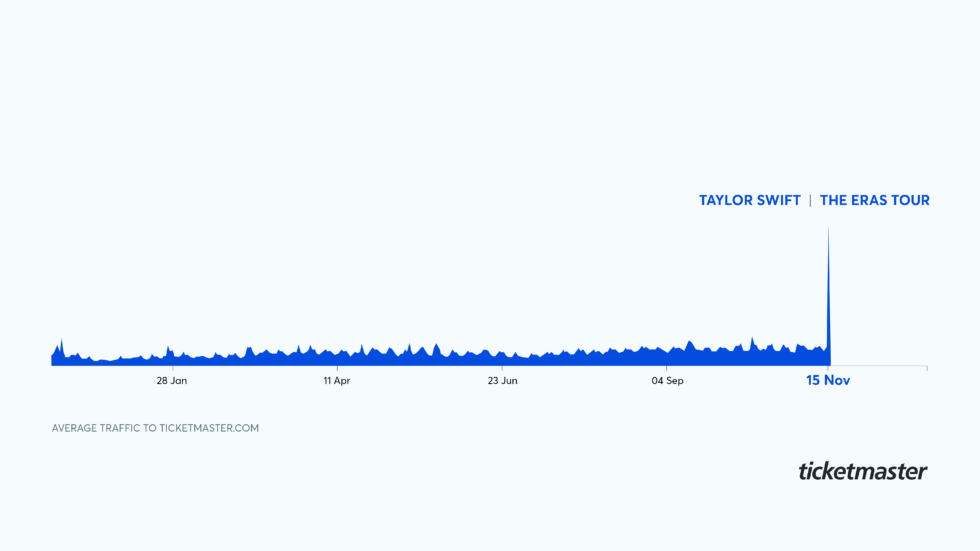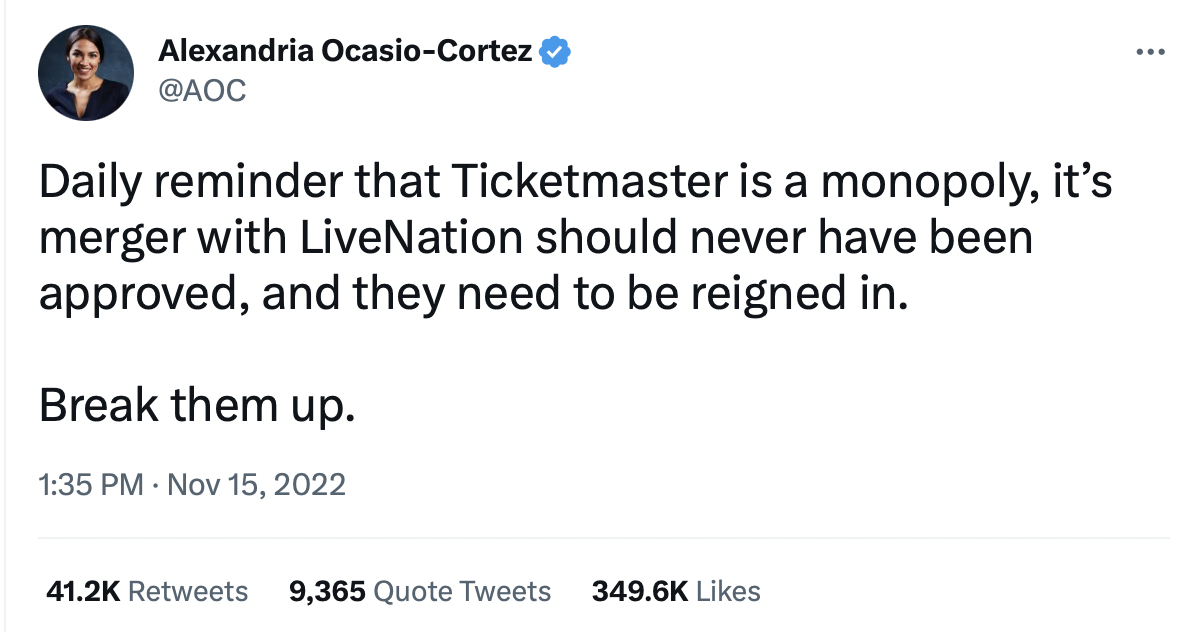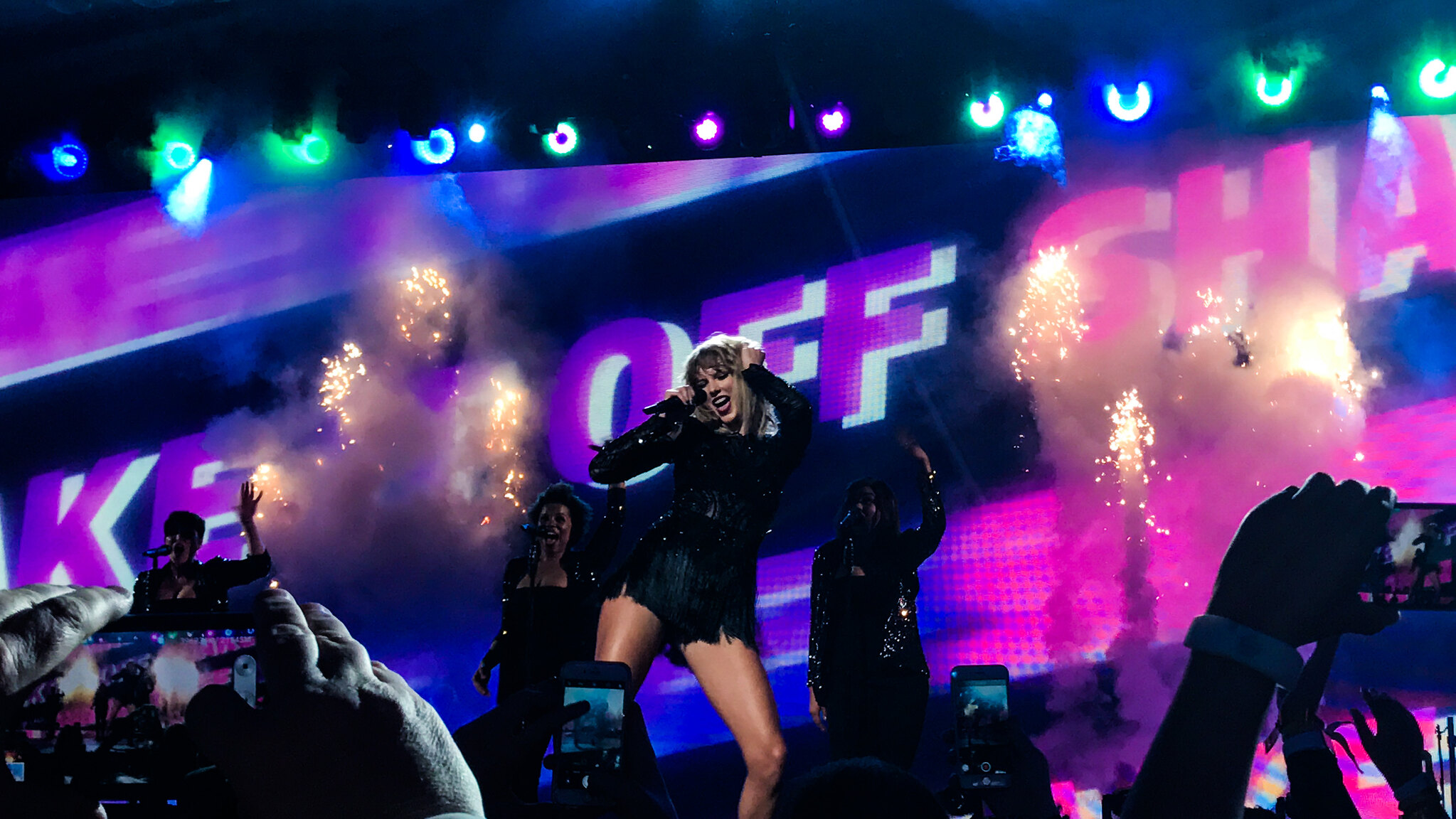On Tuesday, November 15, 2022, entertainment giant Ticketmaster began to sell tickets for Taylor Swift’s tour, but their lack of preparedness led to long wait lines, system crashes, and legislators calling for an overhaul of the ever-powerful oligopoly. While monopolies have a long history in the United States, their power has undoubtedly evolved beyond the reach of 20th century legislation. It is time to re-evaluate the mergers of powerful companies, recognize the monumental impacts that they have on the economy, and revisit antitrust legislation that has failed to stop the formation of monopolies.
THE MAKING OF THE MONOPOLY
When Americans think of monopolies, they may think of giant companies like Amazon, Google, and Apple. Ticketmaster is another company that people associate with monopolies. In theory, these companies are oligopolies, meaning they have viable competitors. However, when the strongest competitor is unable to compete at the same level as the dominant company, it can result in a monopoly-like system. While some argue that this is competition in practice, others claim it results in companies growing beyond the reach of policy makers and regulations; Ticketmaster is an example of this.
In 2010, Ticketmaster and former competitor Live Nation merged and “exerted a chokehold on Live Entertainment,” creating what is now Live Nation Entertainment. The DOJ permitted the merger, under the claim that it “would encourage competition and send ticket prices down.” However, this meant that one company now controlled roughly 70% of the concert ticket market and 127 amphitheaters and clubs in the United States. This merger has essentially given Ticketmaster a monopoly over the concert and live entertainment industry, leaving consumers, artists, and venues stunned by Live Nation Entertainment’s market dominance.
TAYLOR NATION, BOTS, AND APPARENTLY, EVERYONE ELSE
Taylor Swift is no stranger to a stadium tour. In 2019, her Reputation tour was the highest grossing stadium tour of all time. When her long-awaited 2022 tour was announced, fans took various avenues to receive a coveted code for early-access ticket purchasing. The most sought out was the Verified Fan presale code, created by Ticketmaster to weed out bots and ticket scalpers, the system gives pre-registered fans codes to buy tickets days before the general sale. It is meant to “level the playing field” and “create a safe and reliable ticket-buying experience for … fans.” However, when fans attempted to input their codes and buy tickets, they experienced a crashing system, endless wait times, and sold out venues.
Ticketmaster was scheduled to have the Verified Fan Access on sale at 10 am local time across the country but, at 10 am EST fans reported system glitches including dropped pages and non-functional codes. By 10 am PST, the system had completely crashed and ticket sales were rescheduled for later that day. On Thursday afternoon, the day before the scheduled general sale, Ticketmaster released a statement that they no longer had sufficient tickets available for fans, canceling the sale.
Ticketmaster reports that roughly 40% of the Verified Fan Codes are used during the Verified Fan presale. Given that they released 1.5 million codes and put 2 million other fans on the waitlist, the site believed that they were well prepared for the flow of traffic. However, on the day of the sale, 3.5 billion system requests from bots and fans without codes attempted to purchase tickets. As the systems crashed, re-sellers were already listing their tickets at prices reaching close to $100,000.

Source: Ticketmaster
BIDEN, AOC, AND CALLS FOR AN INVESTIGATION
Break Up Ticketmaster has been calling for the reversal of the 2010 merger, and within hours of the crash, legislative officials were also responding. Congresswoman Alexandria Ocasio-Cortez (D-NY) tweeted against Ticketmaster, calling the company a monopoly and criticizing its 2010 merger with LiveNation. Senator Richard Bluenthal (D-CT) echoed these sentiments, tweeting that the merger “harms consumers by creating a near-monopoly,” and urged the Department of Justice (DOJ) to investigate. Minnesota Senator Amy Klobuchar (D-MN) released a concurring statement, saying that “when there is no competition to incentivize better services and fair prices, we all suffer the consequences.” Tennessee’s Attorney General, Jonathan Skrimetti (R) responded to complaints from fans saying he was launching an anti-trust probe into Ticketmaster.

The magnitude of the crash even captured the attention of the White House. On November 18, three days after sales began, President Biden repeated this sentiment in a tweet in another direct call against Ticketmaster. That same day, the DOJ was reported to have opened an antitrust probe into Ticketmaster and Live Nation’s holding power in the live music industry.
THE DUTY OF THE DOJ
As the DOJ opens this probe, it is essential that they look at the market, or lack-there-of, that Ticketmaster and Live Nation have created.
1. Understanding the pitfalls of current antitrust law
The 1890 Sherman Anti-Trust Act was signed to combat the formation of trusts and monopolies that restricted trade and commerce. Loosely defined, it has both brought about major wins for anti-trust movements and created loopholes. The Clayton Act sought to address some of these challenges by prohibiting mergers and acquisitions where the companies may “substantially lessen competition, or..create a monopoly.” In compliance with the Clayton Act, Ticketmaster notified the government of its plans ahead of time. However, despite the notification and compliance to the conditions set forth by the government, the merger was allowed to continue. The government must develop stricter standards for any future merging.
2. Re-visiting the 2010 merger with Live Nation and understanding the lack of competition created in the market
When the DOJ did not halt the merging of Ticketmaster and Live Nation, they allowed Live Nation Entertainment to seal a deal worth $835 million. It has since become too powerful and is not providing the competition that was expected. With a hold on the ticket market, consumers were not only forced to purchase through Ticketmaster, but also faced gauged prices from resellers. The Department of Justice must investigate if there still exist any true competitors in the market, how resellers impact the market, and if the dismantling of the monopoly is needed.
3. Defining a “modern monopoly” and addressing outdated regulations
The monopolies that existed in the 1890’s, when Big Oil jump-started antitrust laws, do not compare to the sophistication of modern monopolies enhanced by technological advances. Only three pieces of legislation have made a significant impact in limiting these corporations, but the last time any such antitrust legislation was passed was over a century ago. It is time Congress revisit the function of monopolies in the modern era, the lack of competition that occurs with oligopolies, and the likelihood of other major mergers in the near future.
CONCLUSION
There are no significant antitrust laws that address the issues of monopolies in the modern era. Despite prolonged calls for Congress to crack down on anticompetitive behavior, companies have been successful in completing mergers that have created powerhouse companies. Ticketmaster’s failure to anticipate the overwhelming surge has opened Pandora’s box into the grasp Live Nation Entertainment has imposed on the entertainment industry. While news cycles tend to move on quickly, there are nine months of Swift concerts ahead, and it seems that trouble for Ticketmaster is only just beginning.
Anais Lopez is a Junior Online Editor with GPPR and a First Year Master of Public Policy Student at the McCourt School of Public Policy. Anais works as a consultant of Latino politics and is interested in politics, data analysis, and opinion polling. Anais obtained her undergraduate degree at UCLA in Political Science and Chicano Studies.
